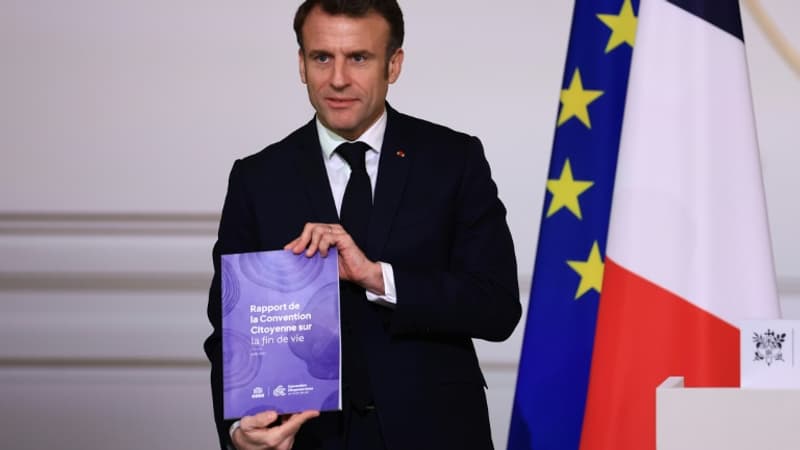A simple postponement or a funeral whose name is not mentioned? The end-of-life bill announced by Emmanuel Macron “for the end of summer 2023” should ultimately not be presented to Parliament until “next year”. Are we to understand that assisted suicide and euthanasia will not be legalized anytime soon? Response elements.
“There is no delay. No specific time has been announced and we are adapting to the demands of the Assembly,” trivializes the office of Franck Riester, Minister of Relations with Parliament, to BFMTV .com.
“There are people waiting behind, sick people”
Last April, Emmanuel Macron received dozens of citizens who had participated in the End of Life Convention at length. The vast majority of these randomly selected people defended the use of euthanasia and assisted suicide, highlighting important nuances.
The president then announced that he wanted a bill “by the end of summer 2023” prepared “in co-construction” with “the Government” and “parliamentarians”, while setting his own “red lines”. Since then, not much has been leaked about the progress of the work.
“The president said that everything would be ready in September. And there is nothing. There are people waiting, but they are sick,” upset rebel deputy Caroline Fiat, author of a report on the end of life and assisted suicide.
Before asking yourself: “a text next year, will it be in January 2024 or December 2024?”
A bill suspended from the deployment of palliative care
In the ranks of the executive we refer to the Minister of Health, Agnès Firmin Le Bodo, officially in charge.
“He consulted widely, received everyone, parliamentarians, representatives of religions, associations of caregivers and patients. He worked enormously,” explains a person familiar with the matter.
It must be said that the creation of “active assistance in dying” required by the Citizens’ Convention remains suspended from the palliative care development plan.
The president himself has walked on a hill since his arrival at the Elysée. Despite several initiatives from his own majority on the issue, the president closed the door to any changes in the law during his first five-year term, taking care not to make his opinion on the matter known.
Macron, between the fear of “humiliating” Catholics and the “conviction that we must move”
Before finally explaining that he had “the conviction that we must move forward” towards the end of life in September 2022, even raising the possibility of a referendum and then turning to a citizens’ convention.
But it is not about moving too quickly on an issue that he considers a source of tension. At the beginning of the work of the Citizens’ Convention, the Head of State did not hesitate to mention to the religious dignitaries his “saving doubt” and his need for “maturity” on this “complex” issue.
With an obsession: not to “humiliate” Catholics, as he explained in favor of marriage for all. But the president also seems hesitant on a more personal level.
“Death, not a technical act”
If the issue was indeed discussed between the Pope and Emmanuel Macron on Saturday in Marseille, nothing has been leaked about the content of their exchanges. But in October 2022, the president spoke to some journalists after an interview at the Vatican.
“On the issue of the end of life, I spoke with the Pope about it, telling him that I did not like the word ‘euthanasia’. Death is a moment of life, it is not a technical act,” the president later explained to the Spot.
During the last presidential campaign, Emmanuel Macron seemed to have evolved, saying that he was personally “in favor” of France “evolving” towards “the Belgian model”, that is, towards the legalization of euthanasia for people with diseases considered incurable.
“Without taste for social issues”
The Elysée had finally backed down from the Catholic newspaper The crossexplaining that the president refused to apply her convictions to “an entire country.”
“Macron doesn’t have much taste in social issues. He approaches them with distrust. We saw it at the PMA for female couples. He was entertained throughout the five-year mandate before we got there,” translates a Macronist deputy in retrospect. .
In the governmental field, however, we made sure to respect the calendar, citing the delivery of the copy of the Minister Delegate of Health “at the end of September” to Emmanuel Macron before possible corrections, followed by an examination in the Council of State and finally a debate in the Assembly and the Senate.
“We have a president who calls himself a reformist and could ignore a law demanded by the French? It would be a political mistake,” says Olivier Falorni (Modem), president of the end-of-life study group in the Assembly.
According to an Ifop survey, 78% of respondents want a change in end-of-life legislation.
Source: BFM TV


